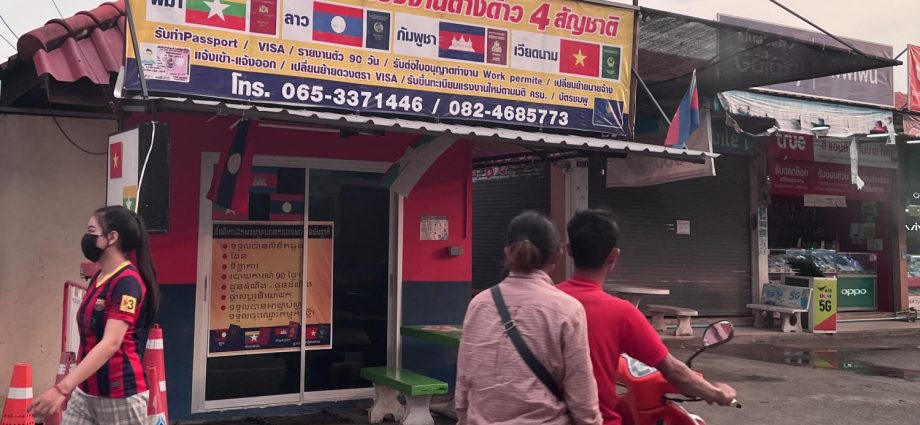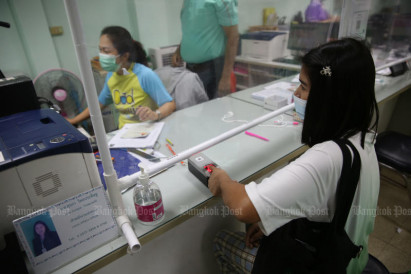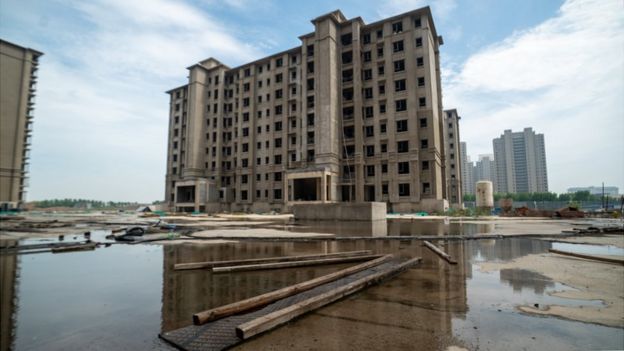Migrants get an extension on amnesty
500k workers need to sort out their permits

The cabinet has agreed to extend its foreign migrants’ amnesty programme until the end of the month, allowing about 500,000 workers from Cambodia, Laos, Myanmar and Vietnam to sort out the permits they need to legally reside and work in the country.
Deputy government spokeswoman, Traisuree Taisaranakul, said on Thursday that the decision to extend the amnesty programme was reached on Tuesday.
First launched on Feb 7, the foreign migrants’ amnesty programme was intended to help stem the nation’s labour shortage by allowing migrants from Cambodia, Laos, Myanmar and Vietnam living in Thailand illegally to come forward and register without being penalised.
However, when the scheme ended on May 15, it was found that over 500,000 workers had yet to register with labour authorities, citing administrative and/or financial hurdles.
Ms Traisuree said the programme’s extension would ensure more foreign migrants are protected under Thailand’s labour laws.
“This is important as migrant workers are a vital part of Thailand’s labour force and are key to the country’s post-pandemic economic recovery,” she said.
The extension will also cover any dependents of the migrant workers who are under 18, she said.
In an effort to streamline the registration process, the migrants will be processed depending on which category they fall under.
The first, she said, are migrants from Cambodia, Laos, Myanmar and Vietnam who hold valid passports but failed to renew their permits, while the second are migrants from said countries who came to Thailand on a special labour arrangement. The third, she said, are migrants who entered Thailand illegally and had never applied for a work and/or residence permit.
Tech upgrades to boost public service

The Bangkok Metropolitan Administration (BMA) has come up with a plan to reduce public service wait times at district offices by upgrading their technological capabilities.
During a meeting with Bangkok’s heads of agencies yesterday, governor Chadchart Sittipunt said from January to last month, 70,000 people applied for ID card services, and about 400,000 asked for house registration services.
However, the BMA found that 52% of them had to wait more than 15 minutes to receive services, especially for ID cards, he said, adding the BMA had a target to limit the waiting time for each person to 15 minutes.
Only 48% of the people received services within 15 minutes of waiting. As a result, the governor said the 50 district offices need to improve the speed of services given to people. “We will use technology to quicken [services] so people do not waste their name hanging out inside each district office,” he said.
He said he is considering implementing online booking for queues related to ID cards and housing registration, Line alerts on queues and a system that records the timestamps of problems that may occur.
He said the Line alerts will also inform him and the management team of each district about problems that arise. The system will also record complaints from people, which will help improve service efficiency, he said.
Regarding call congestion and lack of answering the phone at some district offices, he said the BMA sent out letters to more than 1 million people informing them that officials upgraded its database and land tax system so they can handle 400,000 additional people.
As a result, landlines in some district offices were jammed up, he said, adding that the BMA will order each district office to have a dedicated phone line so officials can answer questions.
Mr Chadchart also discussed his waste management plans.
He said the use of rubbish trucks in most districts is not in-line with their rental contracts, causing management inefficiencies. He said each truck is required to work for 16 hours a day, split into day and night shifts. However, the trucks only run for eight hours, he said.
He then outlined plans to enhance truck usage, including allowing rubbish collectors to work overtime, modifying collection routes or employing homeless people to work. He said he is also planning to change the collection period to twice a week to help boost truck usage.
Tech upgrades to boost Bangkok public service

The Bangkok Metropolitan Administration (BMA) has come up with a plan to reduce public service wait times at district offices by upgrading their technological capabilities.
During a meeting with Bangkok’s heads of agencies on Thursday, governor Chadchart Sittipunt said from January to last month, 70,000 people applied for ID card services, and about 400,000 asked for house registration services.
However, the BMA found that 52% of them had to wait more than 15 minutes to receive services, especially for ID cards, he said, adding the BMA had a target to limit the waiting time for each person to 15 minutes.
Only 48% of the people received services within 15 minutes of waiting. As a result, the governor said the 50 district offices need to improve the speed of services given to people. “We will use technology to quicken [services] so people do not waste their name hanging out inside each district office,” he said.
The governor said he is considering implementing online booking for queues related to ID cards and housing registration, Line alerts on queues and a system that records the timestamps of problems that may occur.
He said the Line alerts will also inform him and the management team of each district about problems that arise. The system will also record complaints from people, which will help improve service efficiency, he said.
Regarding call congestion and lack of answering the phone at some district offices, he said the BMA sent out letters to more than 1 million people informing them that officials upgraded its database and land tax system so they can handle 400,000 additional people.
As a result, landlines in some district offices were jammed up, he said, adding that the administration will order each district office to have a dedicated phone line so officials can answer questions.
Mr Chadchart also discussed his waste management plans.
He said the use of rubbish trucks in most districts is not in-line with their rental contracts, causing management inefficiencies. He said each truck is required to work for 16 hours a day, split into day and night shifts. However, the trucks only run for eight hours, he said.
He then outlined plans to enhance truck usage, including allowing rubbish collectors to work overtime, modifying collection routes or employing homeless people to work. He said he is also planning to change the collection period to twice a week to help boost truck usage.
Niem ready to settle overdue payments

The National Institute for Emergency Medicine (Niem) will begin disbursing a 969-million-baht budget it has earmarked to settle overdue payments for emergency response services provided by rescue foundations.
The overdue payments will be cleared in September before the new fiscal year kicks off in October, according to Niem.
The budget is set for release in response to complaints this week by eight rescue foundations in the Northeast, which said they had not received financial support from the institute for months.
The overdue payments for services rendered from October last year to February this year are expected to be disbursed in August and September, which precedes the onset of the new fiscal year in October, according to Niem deputy spokesman Karan Sriwattanaburapha.
Normally, Niem pays the financial support to rescue foundations twice a month. However, a prolonged glitch in its database system has delayed the payments and caused the institute to be unable to reimburse the foundations sooner, according to Mr Karan.
Mr Karan said Niem had contracted National Telecom (NT) to streamline its database for a more efficient disbursement of funds in March. During the revamp, database processing had to be done manually, which added to the delay.
He gave his assurance that Niem’s new payment database will be more secure and more widely accessible.
“We are grateful to those rescue workers and volunteers who are always by the people’s side regardless of the situation,” said Mr Karan.
Earlier, rescue foundations in the Northeast suspended their emergency response services, which they delivered to the general public for free, as financial support from Niem had stopped.
According to the Phutthatham Hook 31 Foundation in Nakhon Ratchasima, at least five of its 50 rescue teams had stopped operating emergency ambulance services as they did not have money for fuel.
This was the case despite the foundation accepting public donations. The foundation said it is more than two million baht in the red.
The foundation added its volunteer teams who still operated had to pay for petrol themselves. They kept the services going because people in emergencies needed them.
Another foundation, Sawang Metta Thamma Sathan, in Muang district of Nakhon Ratchasima, also faced similar budget difficulties.
Commentary: âAn awkward photo-opâ – Japanâs persistent gender problem

For an economy that struggles with labour shortages, women have long been an underutilised resource. Having achieved almost full parity in education attainment, Japan has one of the highest literacy rates globally, and 46 per cent of graduates from tertiary education are female.
However, at the elite University of Tokyo, only around 20 per cent of undergraduates are women. In addition, several universities have been found to discriminate against female students. In 2018, Tokyo Medical University admitted to manipulating the test scores of female applicants for more than a decade to ensure more male doctors. The scandal led to other universities admitting to similar discriminatory practices.
Despite a large percentage of female graduates joining the workforce at junior levels, the female employment rate has tended to drop for women in their 30s as they take temporary or permanent career breaks to focus on childrearing.
FORMER PRIME MINISTER SHINZO ABE’S “WOMENOMICS”
Recognising that Japan’s competitiveness and productivity depend on women’s increased participation, gender was one of the issues that former prime minister Shinzo Abe sought to tackle during his long tenure.
In September 2013, addressing the United Nations General Assembly, Abe stated his intention to create “a society in which women shine”.
A key part of his signature “Abenomics” strategy, which was launched in the same year, was “womenomics”, aimed at boosting female employment rates to the level of other developed economies, and promoting women into management roles. He also pledged to invest more heavily in education and childcare.
Nevertheless, after a decade of “womenomics”, the results are not “shining”.
Police crack down on illegal land sale to Chinese

CHIANG MAI: Police are pursuing legal action against 13 entities, including four Chinese nationals and six Thais, for operating a housing estate in violation of the law in Chiang Mai, deputy national police chief Pol Gen Surachate Hakparn said.
He said that the move came after Chiang Mai police and immigration officers inspected a housing estate covering more than 22 rai in Hang Dong district.
They found that the land is owned by two companies which list Thai citizens as their executives, even though they have no authority to run the business, Pol Gen Surachate said, adding the companies were allegedly used to hold shares on behalf of the real Chinese owners.
“The companies were set up for the purpose of holding land [on behalf of the Chinese suspects],” he said.
“The companies, which are run by Chinese nationals, would then sell long-term leaseholds to Chinese citizens.”
He said that Chiang Mai police and immigration officers had gathered evidence and filed a complaint with Hang Dong police to take legal action against 13 entities, which comprise three companies, four Chinese nationals — one of whom is on the run — and six Thai citizens.
Pol Gen Surachate also said that authorities had previously investigated another housing estate in San Kamphaeng district, which is operated by a company that authorities suspect was acting as a nominee for Chinese nationals.
Prosecutors indicted eight suspects in the case. The case is now being tried by the Chiang Mai Provincial Court, he said, adding that authorities will examine the money trail from the land sales in both cases and reclaim plots which have been illegally transferred to foreigners.
“The two housing estates have Thai nominees operating on behalf of foreigners,” Pol Gen Surachate said, adding assets acquired through money laundering will be seized.
Decision to deport Myanmar children condemned

Academics and NGOs have denounced a decision by Thai officials to deport 126 ethnic minority children at Thairath Wittaya 6 School in Ang Thong to their home country Myanmar.
In early June, local complaints were filed to authorities that a large group of ethnic children had enrolled in Thairath Wittaya 6 School, which had only two teachers, one director and one administrative staff member. Many children told an interpreter they were taken from an Akha village on Doi Mae Salong in Chiang Rai province, a hill separating Thailand and Myanmar.
However, all 126 ethnic minority children at Thairath Wittaya 6 School in Ang Thong were sent back to Chiang Rai on Wednesday, where their parents must pick them up and return them to Myanmar. Ang Thong Immigration Police, Ang Thong Social Development and Human Security Provincial Office and other related agencies organised their return.
A source from the Social Development and Human Security Provincial Office in Ang Thong said 30 children had already been sent back to their homes after their parents showed up to pick them up. The remaining children are at the Social Development and Human Security Provincial Office in Chiang Rai, waiting to be returned to Myanmar.
Asst Prof Darunee Paisanpanichkul, deputy dean of the Faculty of Law at Chiang Mai University, told the Bangkok Post that deporting the ethnic minority children is inappropriate and unnecessary since it is lawful for children of migrant workers to receive an education in Thailand despite their statelessness.
She said that the Department Of Provincial Administration should issue ID numbers for stateless children and register them into the education system. According to the Convention on the Rights of the Child, all children in Thailand are eligible to receive an education despite their ethnicity.
Weera Yooram, director of The Mirror Foundation and Raisom Learning Centre for Ethnic and Immigrant Children, said many ethnic minority children from Myanmar are sent to Thailand under their relatives’ care to receive an education.
Mr Weera said the deportation of the children was cruel.
“If [Thai officials] want them to study in Chiang Rai, they should contact local schools for student admission. [Deportation] will only make them give up education,” he said.
Wasan Paileeklee, the National Human Rights Commission commissioner, said that complaints had been lodged to the NHRC in June, asking authorities to protect the ethnic minority children’s rights to an education.
He said that NHRC had contacted local administrations in Chiang Rai to guarantee the children’s safety and opportunity to attend school.
Last week, police pressed charges of bringing and providing shelter to aliens on Thairath Wittaya 6 School’s principal, a class teacher, a janitor, and two Pa Mok village chiefs. All of them denied the accusations and will fight the charge.
China must rethink its reliance on property sales to see real growth
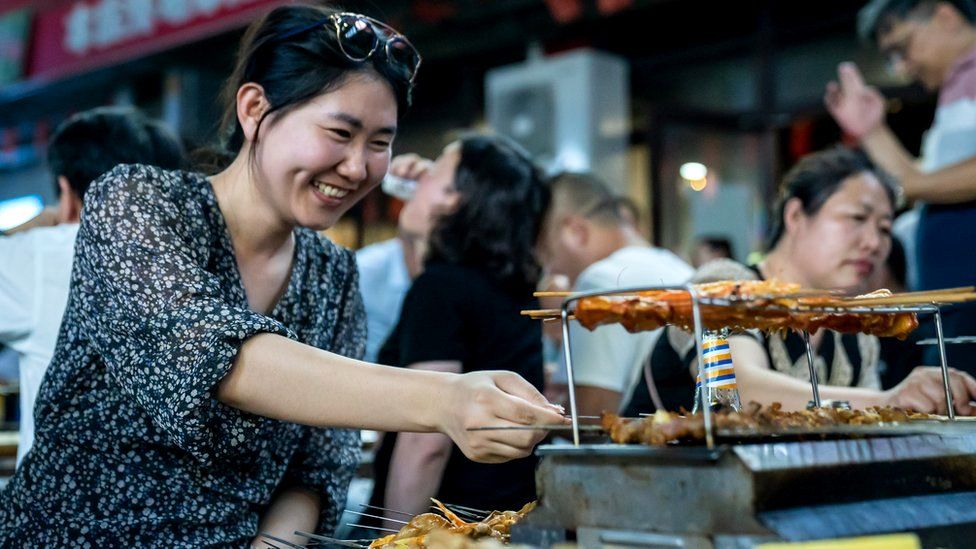 Joyce Liu/BBC
Joyce Liu/BBC The small eastern city of Zibo in Shandong province is experiencing an outdoor barbecue craze.
People from all over China are coming here to taste its lamb skewers, which have become legendary via social media.
It’s quite a raucous experience and certainly not for the faint-hearted.
The street is packed, you sit on little plastic chairs, drink beer and wrap chunks of meat with spring onion on the local flatbread while karaoke songs pump out in all directions.
On the face of it, these crowds appear to show an economy rebounding strongly from the coronavirus emergency – but according to economists that’s not the case.
Rather, they say, this is an example of people choosing a cheap, tasty, option at a time of great pressure on household incomes.
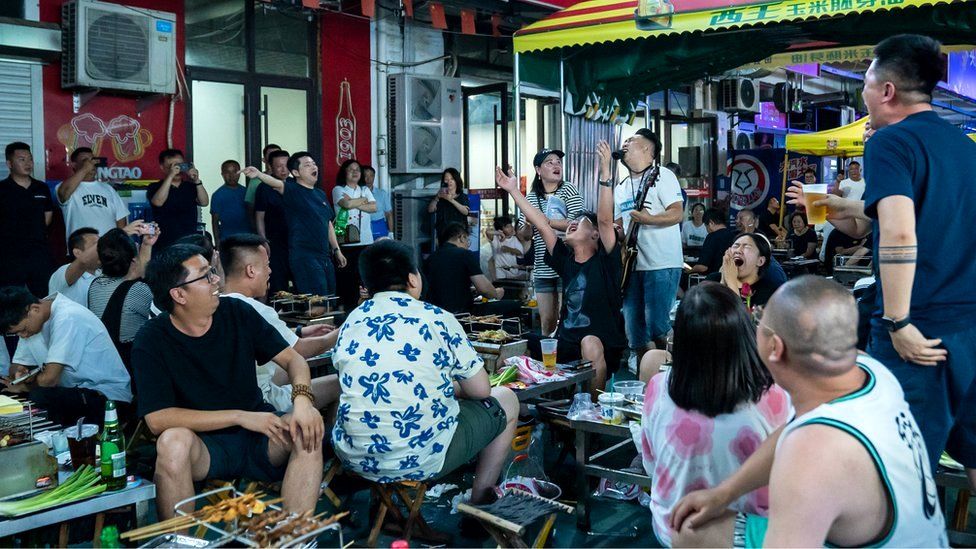
A man sitting with his shirt off tells us this is the perfect spot to enjoy a hot summer night with his family, and that this type of fun has a price tag to match the moment.
“This place is great for ordinary people,” he says. “Recently, it’s been hard to make money but still easy to spend it. After three years of Covid, the economy is only slowly recovering.”
University graduates are being hit especially hard by China’s economic doldrums, with youth unemployment hovering at or above 20%.
Some students are feeling nervous about their futures.
“Yes, I’m worried,” says one woman who’ll soon graduate. “There’s a lot of competition. It’s hard to find a job. All my classmates feel the same pressure.”
For those who have jobs, a big reason for their reluctance to spend big is economic security.
They’re concerned about the potential to join the ranks of the unemployed, and their household’s largest single investment is, in many cases, no longer worth what they thought it would be.
The real estate sector is under great stress in China.
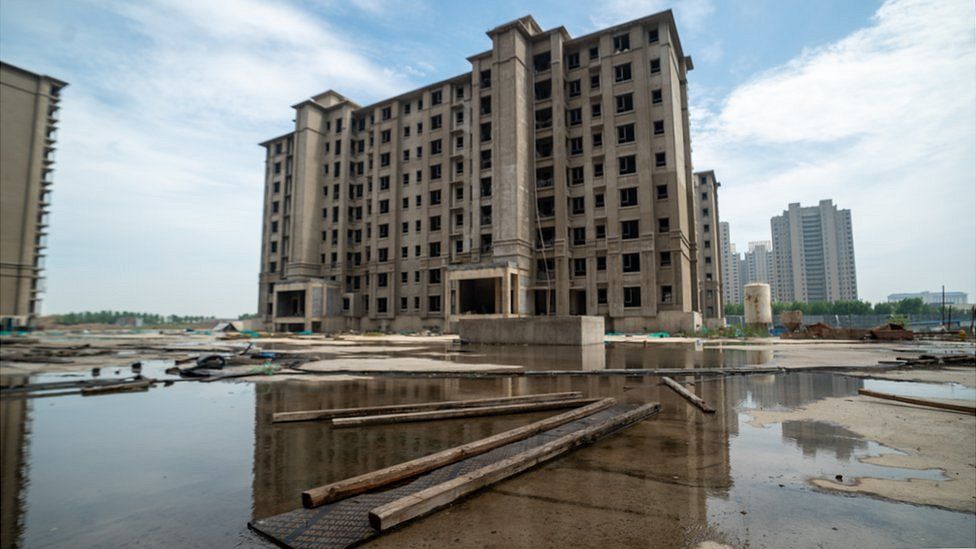
To see this first-hand, we drive a few hours east of Zibo to the outskirts of a much larger city, Qingdao.
Here, a property explosion hasn’t matched real demand from buyers or renters, and the result has been huge housing estates built with very few residents in them.
A woman is selling cold noodles from a portable stand outside her housing complex where she has few neighbours.
A few years ago, her husband bought a flat here after moving to Qingdao to give their child a better start because they heard the schools would be good.
I ask her if she’s worried about the value of her home collapsing.
“Of course I’m worried,” she says. “But what can I do?”
Nearby a couple who are street cleaners have stopped for lunch. They point to the huge estate behind them and say that nobody lives there.
Across the road there is a small forest of concrete towers without paint, without windows and with window frames now looking the worse for wear, having been exposed to the elements.
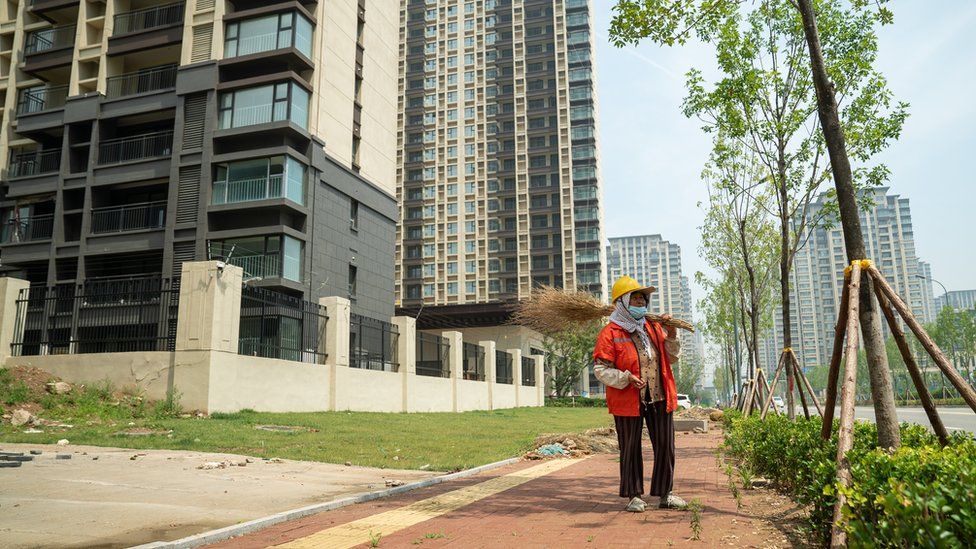
“Construction just stopped there one day last year,” the man says.
According to his wife, the entire suburb is pretty dead. “There’s nothing here. There’s no petrol station. You have to go a long way for fuel. It’s really not convenient to live here,” she says.
There had been hope that this region would take off after it hosted a major political meeting, the Shanghai Co-operation Organisation Summit, and China’s leader Xi Jinping gave it his personal stamp of approval as a place to invest and do business, potentially hosting international expos and the like.
But the factories, start-ups and other companies that would supposedly employ those who bought property here have been few.
According to a local real estate agent, sales volumes have halved in the area in recent years.
“Prices are down because the market is saturated,” she says. “Too many homes were built and it’s hard to sell them.”
We put up a drone to get a bird’s eye view and it looks even worse than at ground level.
Entire new housing estates where work has stopped can be found in all directions. Those that are finished don’t have much sign of life in them.
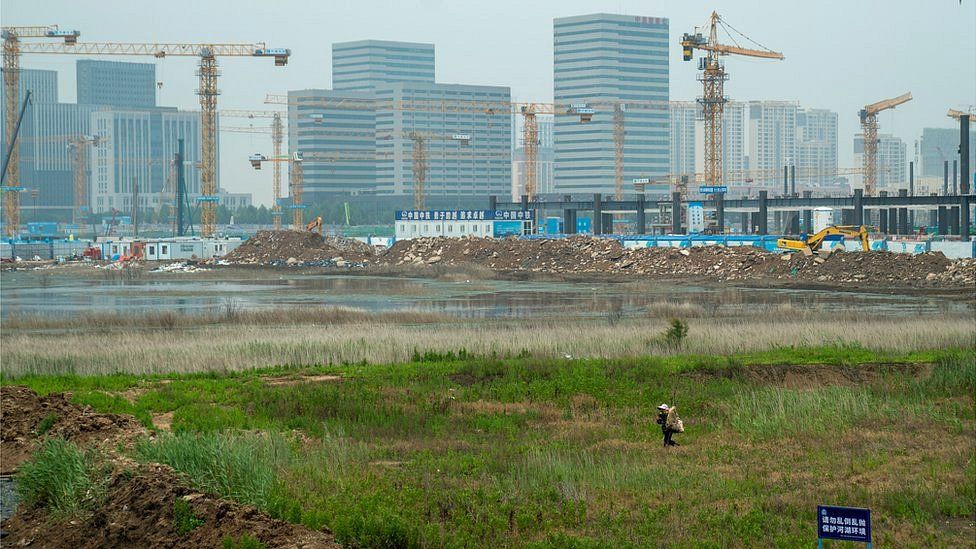
What’s more, this supply and demand problem isn’t unique to this area. It isn’t even unique to this city. In province after province across China, evidence pointing to the danger of a property bubble is easy to find.
One reason for rampant real estate speculation in this country has been a lack of other options for investment. But the boom in real estate drove house prices out of the reach of ordinary families in many big cities. The government response was to cap the number of flats any person could buy.
It was a genuine attempt at an egalitarian reform, but pressure is now coming to reverse this. In Qingdao, such measures have already been eased, in an attempt to stimulate its stalled real estate market.
The challenge for Chinese policymakers is to find a way to wean this economy off such a heavy reliance on property sales to generate growth and business confidence.
Economists like Harry Murphy Cruise, from Moody’s Analytics, think China is facing significant problems.
“China’s economy is in desperate need of rebalancing,” he tells the BBC from Australia. “It’s had that massive period of growth over the last two or three decades from big infrastructure building, from a massive uptick in the property market that is actually not a sustainable growth driver going forward.
“Look around the world, developed economies need households as a key driver of economic growth, and that is just not what China has at the moment.”
The Chinese government is considering ways to promote more spending by individuals and by businesses from interest rate cuts to cash handouts.
But the problem is sentiment.
People will feel more secure when there are more jobs. Businesses need to invest to create more jobs, but they are reluctant to do so while customers are so insecure.
As Harry Murphy Cruise puts it: “It’s sort of like the chicken and the egg. You can’t have that uptick in the economy unless you have business spending. They’re not spending until they see that uptick. So, there’s a stalemate that’s really holding back a key portion of the economy.”
Then there’s the chance that all of this will bleed into global trade.
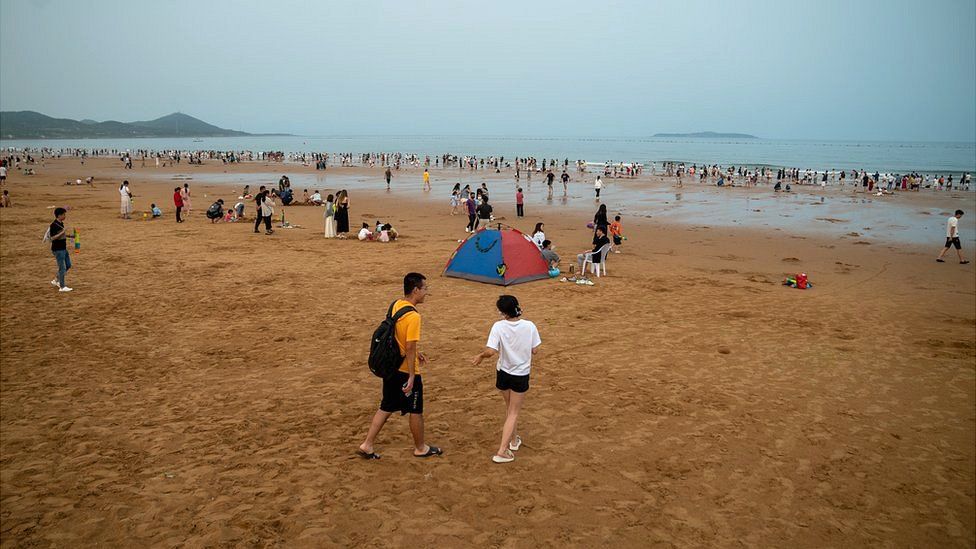
China is big. What happens to the world’s second largest economy turns ripples into waves.
Reduced manufacturing here – off the back of weak international demand – has resulted in fewer exports, fewer Chinese-made goods available worldwide and less business activity in Asia’s mega factory. Then the subsequent slower consumption in China means fewer imports of other countries’ products.
The headache for the Chinese government is that it may have to choose whether to go for a short-term stimulus fix, which would delay the rebalancing it will eventually need to face, or whether to absorb more immediate pain and bring on the long-term solution more quickly.
Naturally, there are almost certainly those in Beijing’s upper echelons of power considering some sort of middle path, starting with a milder boost to stabilise the economy, then considering the larger problems at hand.
Because they know that, once negative sentiment sets in, it can be hard to turn around.
Yet if you want to feel optimistic about Qingdao, and about life, you go to the beach. Tourism along its famous coastline does seem to be picking up.
There’s laughter, sandcastle construction and everyone – whether they’re a captain of industry or a truck driver – is enjoying the great embrace of the ocean.
Whether it matches reality or not, here you almost can’t help but feel that, despite everything, the future still has good things in store.
Related Topics
Runners abandon 1.29m speed pills on riverbank

NAKHON PHANOM: Authorities seized 1.29 million speed pills abandoned by fleeing smugglers on the bank of the Mekong River in the province’s That Phanom district.
Soldiers, police and local officials found three sacks containing the pills bearing the WY logo by the river in Khab Phuang, a village in tambon Nam in the early hours of Wednesday.
The smugglers on board a longtailed boat managed to flee, senior military officers said at a media briefing later that day.
The Office of the Narcotics Control Board and security officers said that speed pills seized along the border recently had been mixed with pesticides to reduce costs.
The drugs were being sold cheaply at 20-25 baht each to attract users, mostly workers and young people.
Increasing quantities of speed pills are being smuggled from Laos into northeastern Thailand. This has prompted security agencies to increase patrols both on land and water to stop the influx.
Over the past week, more than 10 million speed pills have been seized in That Phanom, officers said.
Cops nab 17 in raid over illegal site

Police have arrested 17 Vietnamese citizens for their alleged involvement in an online gambling site and a passport counterfeiting gang.
Yesterday, Bang Phli Police and Immigration Bureau officers raided three houses in Bang Phli district of Samut Prakan, which were being used as a base for the alleged crime ring.
The police said they confiscated 12 computers and equipment used in the production of fake passports, immigration stamps of Suvarnabhumi, Myanmar and Cambodia airports and contraband cigarettes at the house.
All 17 suspects were taken to Bang Phli Police Station for questioning.
Twelve were charged with luring people to participate in gambling, four with possessing official rubber stamps without permission, and one with possessing untaxed cigarettes.
According to their investigation, the Vietnamese suspects operate an online gambling website that is run by their Chinese employers.
The Chinese ringleaders would assign work to the Vietnamese suspects via Facebook accounts registered with a fake identity.
Once the assignments were distributed, the accounts would be closed to evade the authorities.
The three houses had been used as a base by the Vietnamese suspects for about a month.
They had relocated to Samut Prakan from a neighbouring province.
Before the raid, police found a group of illegal migrants whose passports were stamped with illegally-acquired immigration seals.
This led them to the houses in Samut Prakan.
Police also found the suspects had many Facebook accounts using a false identity, which they used to offer online jobs or products to sell.
The suspects would then send the victims links to gambling websites and ask them to sign up.
Many of the victims became addicted to gambling, and the websites were estimated to have millions of baht in circulation each month, according to police.

